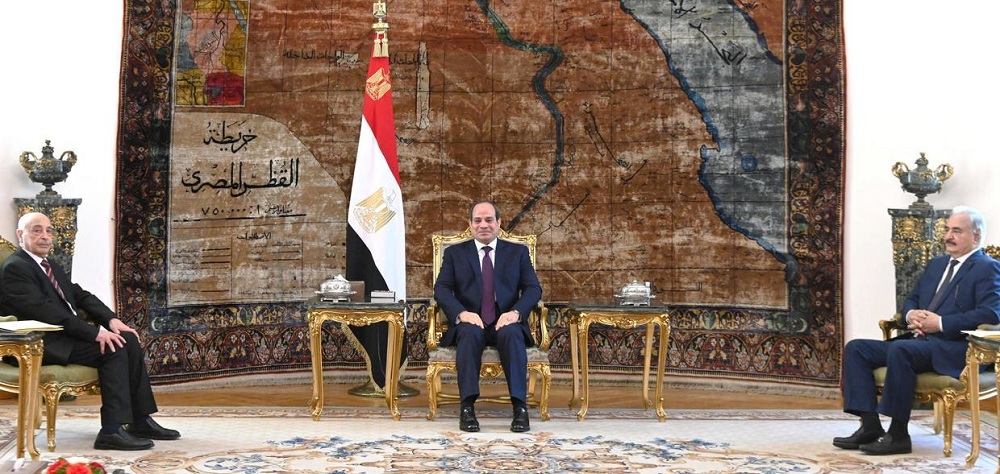Alwaght- Following a meeting with Libyan rebel leader General Khalifa Haftar and east Libya parliament’s speaker Aguila Saleh Issa who made a several-hour visit to Cairo, President Abdel Fatah el-Sisi of Egypt at a press conference said that they agreed to launch a political initiative to end the clashes in the war-weary country.
The initiative called for halting the clashes from Monday and designing a political solution framework to put an end to the Libyan crisis. The announcement drew welcome from Saudi Arabia, the UAE, France, and the US, all of them supporting Haftar’s push to seize the capital Tripoli from the UN-recognized Government of National Accord (GNA). The Secretary-General of the Arab League Nabil Elaraby also threw his organization’s weight behind the initiative.
This comes while the spokesman of the armed forces of the GNA reflected the opposition of the government to the suggestion to halt the military operations.
“We do not have free time to listen to the nonsense of war criminal [Khalifa Haftar] on the satellite news networks. We did not start the war but we definitely determine the place and time for the end of the war.”
Peace proposals fail one after another
The ceasefire proposal in Libya that seeks political dialogue comes while it has no clear outlook of success in sight like its predecessors despite support shown by various countries. Many of the outcomes of the past conferences on the peace in Libya went nowhere while they were backed by many foreign parties which invited the warring sides to engage in dialogue to end the devastating civil war. The results of conferences held in Germany, Italy, and other countries prove that.
A set of reasons can be cited as the factors behind the failure of the ceasefire proposals inviting for peace negotiations.
1. The clashes in Libya brazenly show that a proxy war is underway in the North African country. The clashing sides do not agree to share the power and insist on military victory as the main solution to save their interests. Actually, they are playing a zero-sum game and do not think but about the full elimination of the rival.
2. Even inside the allied circles, there are signs of different and sometimes conflicting views and interests. For example, on the Haftar side, while Egypt wants to as fast as possible end the crisis and secure its western borders, the UAE wants to make the proxy war with Turkey, as the backer of the GNA, longer and more erosive. This certainly has hand in the failure of the peace proposals for Libya.
3. The interests of Egypt and Turkey as the two major actors of the Libyan civil war do not meet. Cairo calls for the immediate exit of the forces it calls “terrorists”, referring to Muslim Brotherhood-aligned fighters. It also has serious considerations about the Turkish presence in Libya. Turkey on the other side continuously transfers the fighters from Syria to Libya and does not want to pull them out as it finds their withdrawal putting at high risk the government of Prime Minister, which guarantees the Turkish interests in the war-torn country.
Goals behind the Egyptian initiative
The important issue regarding the Egyptian initiative is that the Haftar-led forces have been defeated in the majority of the clashes with the GNA forces and have retreated from their positions.
Cairo’s proposal does not give a picture of a comprehensive and strategic plan. It is simply based on two points: Ceasefire and political dialogue. It does not explain if the political negotiations should move within the framework of the Sakhirat Agreement that was reached in December 2015 or a new framework needs to be developed for them.
Moreover, it seems to be a short-term plan and serves as a breathing period for Haftar’s forces to rebuild themselves for new clashes. Over the past few weeks, they walked back from the regions they seized over the past year’s push towards the capital. It, in fact, only insists on cessation of clashes. After all, in case of negotiations held, the GNA will have an upper hand thanks to the recent gains it made against the opposite side. And this is not the outcome Haftar backers will be contented with.
It seems that Egypt seeks to use the ceasefire chance to strengthen convergence in the Haftar camp and possibly change key figures in Tobruk, the seat of the anti-GNA administration in the east. Informed sources talk about plans to replace Haftar should a political solution is reached. They say that Cairo agrees with this plan as planners see Abdulrazek al-Nadoori, the chief of general staff of the Tobruk-based Libyan National Army (LNA), as an appropriate replacement.
Generally, the Egyptian initiative seems to be a tactic to get Haftar out of the critical conditions and organize the situation of Tobruk-based administration. This will help Cairo and other backers of the general to take the next political or military steps.
There is no end to the Libyan civil war in sight. The Egyptian peace proposal is not comprehensive and does not highlight the political solution for the crisis. Rather, it is a tactic to save Haftar as the warlord and his forces live tough conditions amid losses. Libya's case will not be solved without an agreement including all involved sides, especially Turkey and Egypt.



























